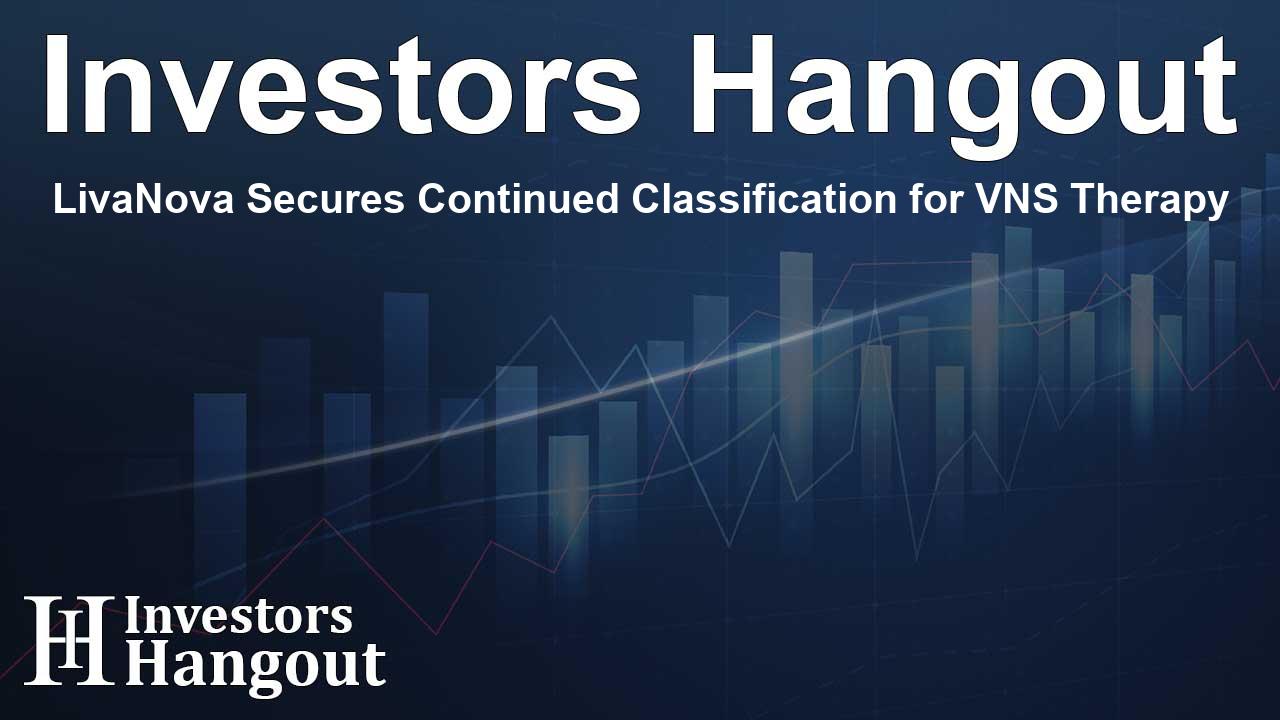LivaNova Secures Continued Classification for VNS Therapy

LivaNova Secures Important Classification for VNS Therapy
LivaNova PLC (NASDAQ: LIVN), a prominent player in the medical device sector, is pleased to announce that the U.S. Centers for Medicare and Medicaid Services (CMS) will maintain its reimbursement classification for VNS Therapy, specifically designed for drug-resistant epilepsy (DRE), at the current payment level for the year ahead. Despite expectations for a potential upgrade in reimbursement classification, the company has reassured stakeholders that it anticipates no adverse effects on its business operations stemming from this decision.
Understanding VNS Therapy
VNS Therapy, which stands for Vagus Nerve Stimulation Therapy, represents a significant advancement for patients suffering from epilepsy who have not achieved desirable results through conventional drug therapies. The continued classification under Level 5 Neurostimulator and Related Procedures Ambulatory Payment Classification (APC) confirms its important role in the Medicare Hospital Outpatient Prospective Payment System over the next year.
Company Insights and Future Directions
Headquartered in London, LivaNova is dedicated to both the development and manufacturing of cutting-edge medical devices focused on enhancing patient care in the cardiovascular and neuromodulation markets. Through its commitment to innovation, the company continues to investigate additional reimbursement pathways for its VNS Therapy aimed at DRE patients, showcasing a proactive strategy to ensure the system's commercial viability.
Strategic Approach to Reimbursement
While the recent SEC filing provided minimal insights into financial forecasts regarding the CMS decision, LivaNova's undeterred pursuit of new reimbursement avenues signals its robust business strategy. The company remains steadfast in its belief that continued exploration of reimbursement options will bolster the performance of its VNS Therapy initiative.
Recent Financial Performance Highlights
Recently, LivaNova reported an impressive 11% growth in revenue during its third quarter, representing the seventh straight quarter marked by double-digit growth. The company has raised its revenue forecast for the upcoming year to a range of 8.5% to 9.5%, while projected adjusted diluted earnings per share are expected to fall between $3.30 and $3.40. CEO Vladimir Makatsaria attributes these positive results to substantial gains in market share across both cardiopulmonary and epilepsy segments, strategic pricing mechanisms, and the successful launch of the Essenz heart-lung machine.
Revenue and Cash Flow Insights
For LivaNova’s operations in the United States, revenue has experienced a 15% uptick, with cardiopulmonary revenue reaching $172 million, alongside a 9% increase in epilepsy-related revenue. As of September 30, 2024, the company's cash balance stood at $346 million, juxtaposed with total debt amounting to $626 million.
Maintaining Investor Confidence
Despite empowering expectations for a rise in research and development (R&D) and sales, general and administrative (SG&A) costs in the fourth quarter of 2024 and an uptick in the adjusted effective tax rate, LivaNova remains optimistic about sustaining its growth trajectory into 2025. The organization is committed to enhancing operational performance and continuing its investment in both market share expansion and innovative solutions.
Looking Ahead: Insights from Financial Data
LivaNova's announcement regarding CMS reimbursement status complements significant financial insights highlighting a steady growth trajectory for the company, boosting investor confidence. The company has shown a remarkable revenue growth rate of 11.04% over twelve months and 11.18% in the latest quarter, mitigating concerns stemming from unchanged reimbursement classifications.
Debt Management and Profit Margins
With moderate debt levels and liquid assets surpassing short-term obligations, LivaNova possesses financial flexibility that further positions it strategically to investigate alternative reimbursement avenues for its VNS Therapy. The organization's impressive gross profit margin of 68.03% allows it ample leeway for revising pricing strategies when necessary.
Frequently Asked Questions
What decision did CMS make regarding VNS Therapy?
The CMS will maintain the existing reimbursement classification for VNS Therapy for drug-resistant epilepsy in 2025.
What are some financial highlights for LivaNova?
LivaNova reported an 11% revenue growth in its recent quarter, and its U.S. revenue increased by 15% overall.
How has LivaNova positioned itself for future opportunities?
LivaNova is actively seeking new reimbursement opportunities and remains committed to investing in innovation and operational improvements.
What does VNS Therapy represent for patients?
VNS Therapy offers a significant treatment alternative for epilepsy patients who have not found relief with traditional drug therapies.
What is the company's outlook for the next fiscal year?
For the upcoming fiscal year, LivaNova is anticipating revenue growth of 8.5% to 9.5% and expects adjusted diluted earnings per share between $3.30 and $3.40.
About The Author
Contact Olivia Taylor privately here. Or send an email with ATTN: Olivia Taylor as the subject to contact@investorshangout.com.
About Investors Hangout
Investors Hangout is a leading online stock forum for financial discussion and learning, offering a wide range of free tools and resources. It draws in traders of all levels, who exchange market knowledge, investigate trading tactics, and keep an eye on industry developments in real time. Featuring financial articles, stock message boards, quotes, charts, company profiles, and live news updates. Through cooperative learning and a wealth of informational resources, it helps users from novices creating their first portfolios to experts honing their techniques. Join Investors Hangout today: https://investorshangout.com/
The content of this article is based on factual, publicly available information and does not represent legal, financial, or investment advice. Investors Hangout does not offer financial advice, and the author is not a licensed financial advisor. Consult a qualified advisor before making any financial or investment decisions based on this article. This article should not be considered advice to purchase, sell, or hold any securities or other investments. If any of the material provided here is inaccurate, please contact us for corrections.
